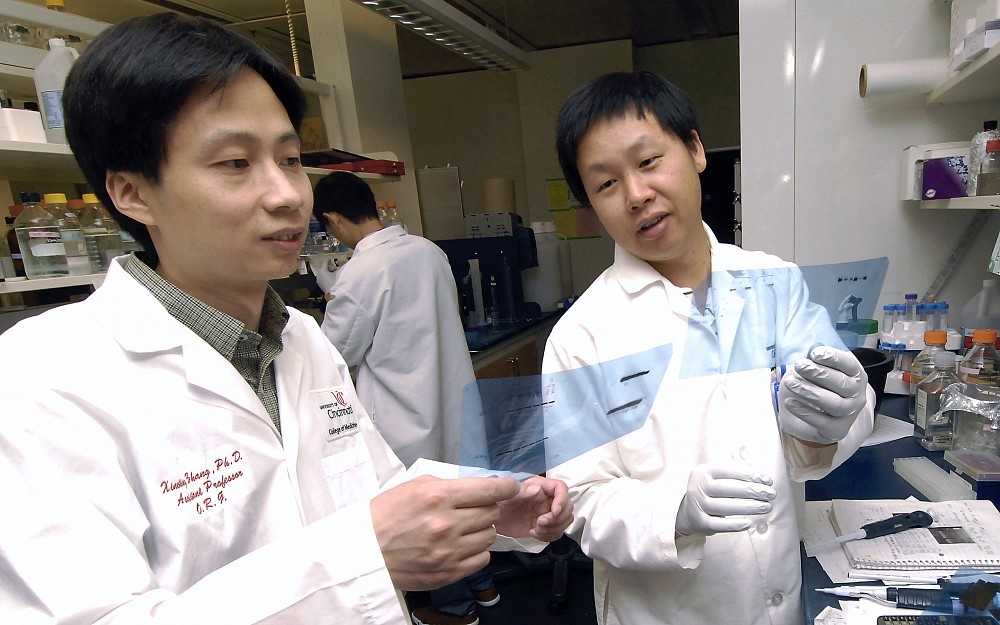
Nanoscale Targeting May Improve Breast Cancer Treatment
In science, pursuing an innovative idea is exhilarating but most funding agencies are reluctant to invest in original research concepts because they are considered risky, untested.
Some grant programs actively seek out those high-risk, high-reward ideas. Xiaoting Zhang, PhD, of UCs cancer and cell biology department recently secured a $587,000 U.S. Department of Defense Breast Cancer Idea Award to develop tissue-specific nanotherapeutics for the treatment of human breast cancer. Innovation and potential impact of the proposed work are what win funding.
Zhang is pursuing an alternative treatment avenue that targets estrogen and its receptor indirectly as compared with current drugs that targetand stopestrogen function directly.
A sort of sneak attack on cancer cells, Zhangs preliminary studies in animal models and cells suggest a promising new approach to estrogen suppression in breast tissue with minimal disruption to the hormones function in other parts of the body.
Approximately 75 percent of human breast cancers express estrogen receptor, so developing effective treatments for stopping the cancer that also minimize side effects of treatment is critically needed.
"Current anti-estrogen drugs called selective estrogen receptor modulators (SERMs) target estrogen receptor directly. Although these SERMs can inhibit estrogen in the breast, they also disrupt important normal functions of estrogen in the uterus, bone and other tissues, making the side effects of treatment costly, explains Zhang, an assistant professor of cancer and cell biology and researcher with the UC Cancer Institute.
His research is based on a recent discovery of an unexpected tissue-specific role of a transcriptional cofactor called MED1 in regulating mammary gland development and stem cell differentiation. He published his initial findings in the 2010 April issue of the PNAS (Proceedings of the National Academy of Sciences).
"MED1 is a downstream co-activator of estrogen receptor that is often present at abnormally high levels in human breast cancers. In this study, we found the interaction between estrogen receptor and MED1 plays a highly selective role in the mammary gland, adds Zhang. "We think it may help us achieve more selective cellular targeting with the combination of highly specific and versatile RNA chains (aptamers).
Using a screening method called SELEX (Systematic Evolution of Ligands by Exponential Enrichment), Zhang will begin building a robust library of RNA aptamers that can be used to screen out the best candidates for disrupting estrogen receptor functions only in breast cancer. RNA aptamers function similarly to antibodies but offer a number of practical advantages in therapeutic applications. RNA aptamers are known to elicit little or no immunogenicity, which means the body is less likely to attack them.
In partnership with UC nanotechnology expert Peixuan Guo, PhD, Zhang will then use pRNA nanoparticles to specifically deliver highly targeted chains of RNAs (aptamers) to breast cancer cells to stop cancer growth.
"This is an exciting time. We have a unique target, optimized selection strategies and the benefit of Dr. Guos novel RNA nanodelivery system. Although there are still challenges ahead, the promise for the future seems good, says Zhang.
"It is a truly innovative project with high potential clinical impact," adds UC Provost Santa Ono, who remains an active, NIH-funded biomedical scientist. "I am glad to see this type of interdisciplinary studies emanating from synergistic collaborations spanning two of our outstanding colleges."

Xiaoting Zhang, PhD, of cancer cell biology, at the Vontz Center for Molecular Studies

Dingxiao Zhang, Xiaoting Zhang, PhD, Jesse Meeks and Lijiang Zhang.

Targeting estrogen receptor coactivator MED1 by RNA aptamers

Peixuan Guo, PhD, is director of UC's NIH Nanomedicine Development Center
Tags
Related Stories
ChemoID test leads to better outcomes in platinum-resistant...
April 7, 2025
MSN and MSN UK highlighted results from a new Phase 3 trial published in the journal npj Precision Oncology that found a cancer stem cell test can accurately choose more effective treatments and lead to improved outcomes for patients with platinum-resistant ovarian cancer.
Study: Platform-predicted treatments improve outcomes for...
April 4, 2025
Results from a new Phase 3 trial published in the journal npj Precision Oncology found that an assay that includes an assessment of cancer stem cell sensitivity to chemotherapy can accurately decide more effective treatments and lead to increased outcomes for patients with platinum-resistant ovarian cancer.
Pediatrician celebrates 30th UC College of Medicine reunion with...
April 3, 2025
There’s a vital thread woven into the fabric of Chris Peltier’s life. It’s black and red, and it knits all things Bearcat together into a life that was transformed by the University of Cincinnati and the UC College of Medicine.
